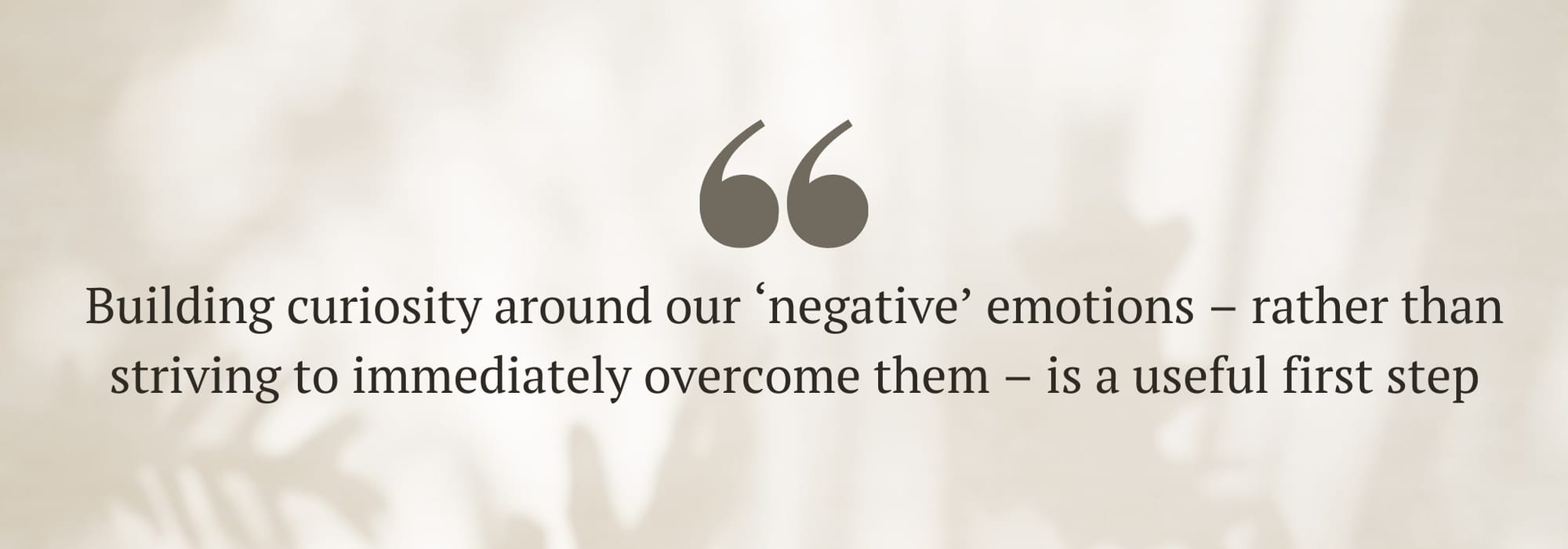Could adopting the ability to let things go help us navigate life’s challenges?
We live in a culture where being a ‘go-getter’ is a highly valuable quality. Bouncing back and getting up to face the challenge again is what success looks like, right?
In Japanese society, the adjacent philosophy of ‘gaman’ is a Zen Buddhist term, which refers to the quality of enduring what appears to be unbearable with dignity, grace, and self-restraint. It’s not a goal-oriented approach, but instead a steady reaction to hardship. Following the Tōhoku earthquake and tsunami in 2011, the ‘gaman spirit’ is often credited for the lack of looting, collaboration, and resiliency following the disaster. Tied up in this culture is a common phrase: ‘sho ga nai’ (informal) or ‘shikata ga nai’ (formal), translating to ‘it cannot be helped’.
Now, this isn’t the kind of inspirational saying that you’d want to get as a tattoo – not unless you want to raise eyebrows in Japan. It’s a very commonly said phrase, comparable to ‘That’s life’ in English. It encapsulates a sense of accepting a situation and moving on, but it’s not always seen in a positive light, and can sometimes be interpreted as defeatist. In Japan, there has been some debate in the past about whether the ‘shikata ga nai’ culture is a good or bad thing, with one article in The Japan Times dubbing it a ‘curse’ that halts change, while another argues the culture encourages Japanese people to live in the moment.
It should go without saying that total passivity can come with risks – when something is wrong or harmful, it’s important to stand up and advocate for ourselves. But is there a balanced approach to the ‘shikata ga nai’ culture that we can apply to our own lives? One that places acceptance at the forefront when appropriate, for the benefit of our overall wellbeing?
Nick Rothengatter is a life coach and acceptance and commitment therapy (ACT) practitioner, ACT being an approach that focuses on finding peace in the process instead of driving forward to solutions, and which shares common ground with ‘shikata ga nai’ culture.
“ACT is a mindfulness-based form of cognitive behaviour therapy,” he explains. “It views things like ‘human suffering’ as normal, not a disorder driven by pathological processes. Symptom reduction (like reducing anxiety) is not a goal within ACT. Instead, ACT is all about expanding your repertoire of behaviour (what you are able to do with your body and focus) in the presence of difficult stimuli. Or, in plain English, when you find yourself in tricky and challenging situations, finding a way to make room for these experiences so you can still put your attention on doing what matters.”
For those who are drawn to ACT as a treatment option, the philosophy encourages us to let go of constantly striving for an unrealistic ideal of total contentment, and accept the natural lulls as they come. It’s something that, Nick shares, has supported him personally.
“Me and my partner’s journey through years of fertility struggles was a difficult pill to swallow. Acceptance was not even on my radar; instead questions like, ‘Why me?’ And, ‘What did we do wrong to deserve this?’ filled my mind as we were both healthy and young. Seeing other families with less healthy parents was personally difficult, because it reminded me of the unfairness of life.”
As Nick sees it, making space for those feelings of resentment – accepting them rather than diligently ploughing through them – came with a tangible benefit.
“In a way, our resentment reminded us to continue to explore alternative ways to have a family, and not to give up,” he says. “Now, we have a family, and I am forever grateful that we somehow managed to make room for our pain and remembered what we cared about.”

Building curiosity around our ‘negative’ emotions – rather than striving to immediately overcome them or to submit to them totally – is a useful first step, and Nick encourages using these instances as moments to connect with ourselves.
“Everything that shows up in our body and mind has a purpose,” he reflects. “See them as internal messages of wisdom, shedding a light on the things we care about. Because if you didn’t care, why would these feelings and thoughts show up in the first place? The same is true when we struggle to let go of something. The inability to let things go, reveals our attachments, our values, and what truly matters to us. In that space, there is a bit that is useful, and a bit you can, unfortunately, lose yourself in.”
‘Acceptance’ can be seen as the easy answer, but Nick explains that not only is that often unrealistic, but ‘acceptance’ itself is often misunderstood. Returning to ‘shikata ga nai’, healthy acceptance is about understanding something ‘cannot be helped’ but without completely submitting to the ‘so why bother’ conclusion, and rather exploring those feelings with compassion.
“I recommend starting small,” says Nick, when considering the question of where someone may want to begin when working on their ability to accept challenges. “Work on noticing what is showing up for you. And from that space of awareness, you can develop skills to allow, accommodate, and create space for this difficult stuff that is coming to the surface. Practising these skills can help you take the sting out of these experiences, so you can better follow up on how you want to respond, instead of letting these internal messages control you.”
Nick recommends working on your ‘inner noticer’ – the part of you that is good at observing and witnessing things. He shares that you can do this by engaging in activities like sports and being in nature, activities that encourage you to connect with your body and your surroundings, and take you out of your busy mind to a place where you can take an observant approach to your experiences.
“The key here is to keep practising,” he adds. “Practising doesn’t make perfect, but it does make you better equipped to respond more consciously next time life decides to throw you a curveball.”
There are pros and cons to both the ‘gaman’ and ‘shikata ga nai’ cultures, in the same way that the British ‘stiff upper lip’ can either be seen as protective self-preservation or repressive. The key thing to take from the philosophy of ‘shikata ga nai’ is the ability to detach from, and let go of, particular challenges. Because no matter how closely we follow any advice for a perfect life, bad days will happen – but with curiosity and compassion, they may not have to last for long.


Comments